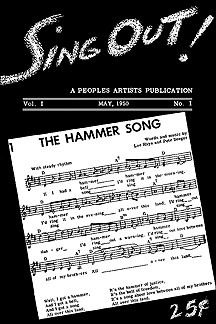
The Hammer Song – Hays/Seeger
In both “Where Have All the Flowers Gone” and “American Favorite Ballads”, Pete Seeger says this about ‘The Hammer Song’: “We wrought better than we thought.” I can only imagine he meant the song turned out better than he could have ever hoped, and it continues to withstand the test of time.
The song famously graces the cover of Volume 1 of ‘Sing Out!’ Magazine, a publication which was co-founded by some of the largest names in American folk music including Irwin Silber and Pete Seeger. This magazine is still publishing folk songs today, and has been a cornerstone of American folk music for more than 60 years now.
It was written by Lee Hays and Pete Seeger, and recorded by their band the Weavers in 1949 (the Weavers was a quartet consisting of Hays, Seeger, Ronnie Gilbert, and Fred Hellerman). The record label it was recorded with, Charter Records, was small, and the song was set aside during the peak of the Weavers’ touring career for fear of being blacklisted.
Not to be forgotten, however, as in 1958 Peter, Paul, and Mary recorded a version which brought them and the song into the spotlight. It is likely this version most people recognize and not the original Weavers recording.

“The Hammer Song” as printed in “American Favorite Ballads” by Pete Seeger in 1961
Seeger is a proponent of taking personal ownership of a song. In the foreword to “American Favorite Ballads”, he writes:
“Now, if you love one of these songs, you can make it your own by singing it; through the years it will become part of your life as little by little you change the tune in subtle ways, or add or subtract verses.”
This song in particular has changed a lot over time. If you listen to the original recording and compare it to the Peter, Paul, and Mary version just a few years later, you can already hear a difference. In 1993, Seeger joked that “one can sing the melody as I wrote it, or as various others have changed it, all at the same time. Somehow they all harmonize with each other. There’s a good moral here, for the world.”
Below is the original Weavers recording, and you can click here for the Peter, Paul, and Mary recording.